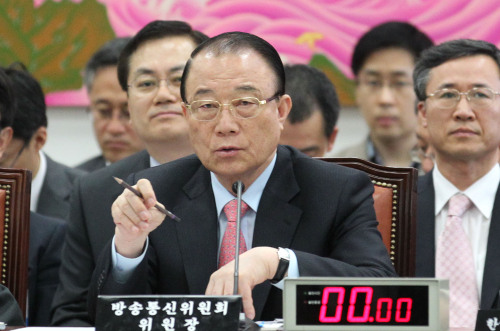Regulator under fire for not consulting industry players
The government’s latest hints that it might try to offer text messaging for free were met with fierce protests from local telecom operators, according to industry watchers.
KT Corp., SK Telecom and LG Uplus all appeared to be upset by recent remarks from Choi See-joong, chairman of the Korea Communications Commission, who told lawmakers Wednesday that the government will be considering persuading telecom companies to offer text messages for free.
“These companies are not state-run, and the money the government is talking about is not some fees for state utilities,” said one shareholder at a local telecom firm who declined to be identified. “I have my rights and I also don’t want to see any value eroded at the company I invested in.”
She also asked how the other shareholders, especially those from overseas would react.
The nation’s telecom operators all have significant numbers of foreign shareholders. KT Corp., for instance, is almost half foreign-owned.
The three firms are estimated to be bringing in sales of between 1.5 trillion won ($1.3 billion) 2 trillion won from text messages, which accounts for about 4 percent of their total sales, according to the Korea Information Society Development Institute.
 |
Choi See-joong, chairman of the Korea Communications Commission, speaks during a parliamentary session Wednesday. (Yonhap News) |
A day after Choi’s assembly appearance, the telecommunications regulator said it was unrealistic to make text messages free, especially considering the overdrive the carriers would experience.
“We meant that we are trying in general to bring costs down,” said one commission official.
Choi’s remarks came on the back of spiraling complaints that local households are excessively burdened by communication fees, such as mobile phone bills.
The telecommunications regulator has been promising a number of policies and measures to help trim the costs.
A taskforce formed of officials from top government agencies including the Finance Ministry and the Fair Trade Commission will be announcing finalized plans later this month, Choi said.
Aside from the controversial text messaging scheme, some of the suggested measures include allowing consumers to directly purchase from the handset manufacturers, instead of having to go through telecom operators.
More than 90 percent of local mobile phone users buy wireless devices from operators with a two-year contract that binds them with the same operator for the period in exchange for getting subsidies.
Under the new system, consumers can plug their universal subscriber identity module (USIM) cards into any mobile device, even those purchased outside of Korea without having to register with wireless carrier.
Choi also said the task force was considering other methods for slashing the suggested retail prices, which are 30-40 percent higher compared to the same phones being released overseas.
By Kim Ji-hyun
(jemmie@heraldcorp.com)








![[Today’s K-pop] Blackpink’s Jennie, Lisa invited to Coachella as solo acts](http://res.heraldm.com/phpwas/restmb_idxmake.php?idx=644&simg=/content/image/2024/11/21/20241121050099_0.jpg)